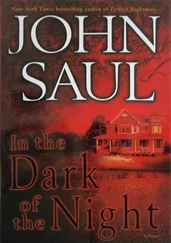“Never mind,” Glen said gently, then turned his attention to his wife. “What’s wrong, honey?”
Rebecca bit her lip, stilling her sudden urge to cry. “Oh, nothing, I suppose. I just wish we had electricity out here. I can’t even see if these dishes are clean.”
“What’s to worry about?” Glen said lightly. “If you can’t tell if they’re clean, we certainly won’t be able to tell if they’re dirty, will we?” Then, sensing that his attempt at humor was a mistake, he got to his feet and moved closer to Rebecca. Robby took his sister by the hand and led her into the tiny room that served as their bedroom. With the children gone, Glen drew his wife into his arms and held her close.
“It’s rough, isn’t it?” he said. Her face pressed against his chest, Rebecca nodded. For a moment she thought she was going to lose control and let her tears flow, but she decided to curse instead.
“Fuck it all,” she said softly. “Fuck it all.” Then, feeling a little better, she pulled away from Glen and grinned uncertainly. “I’m sorry,” she said. “I’ll be fine — really I will. I seem to be able to handle the big things — it’s always some dumb little thing that sets me off, like kerosene lanterns that don’t give off as much light as a forty watt bulb. Not that we’d have any electricity tonight even if we had electricity,” she added as a flash of lightning illuminated the room and the immediate clap of thunder flushed the children from the bedroom. Missy climbed into her father’s arms, while Robby stood in the doorway, his arms clasped tightly around a wriggling black-and-white spaniel. Glen felt a surge of relief at the appearance of the children, the relief that comes when a moment of tension is suddenly broken. He knew the break was only temporary, that the pressures that were building in both of them would have to be defused. But he had no idea how.
The Palmers had been in Clark’s Harbor only five months, but the months had not been easy. At first Glen and Rebecca had told each other that the coldness they felt from the town was only natural, that things would warm up for them. But Clark’s Harbor remained cold, unwelcoming, and many times they had thought of leaving.
If it hadn’t been for Robby they probably would have left.
Robby had never been an easy child. From the time he was a year old, Glen and Rebecca had realized that he was “different.” But only in the last three years had they truly begun to understand that Robby was not just “different,” not just precocious as they had assumed. He was, in fact, ill, and the older he got, the worse his illness became. Slowly, insidiously, Robby’s hyperkinesis had begun destroying all of them. Glen found himself increasingly unable to work, unable to concentrate, unable to create. And nearly all Rebecca’s time was taken up by what she had come to think of as “tending” Robby. She could hardly call it raising him, not even call it supervising him. It was cleaning up after him, trying to anticipate him, struggling to stay ahead of him. Each year Rebecca had become more tired, more irritable, more desperate.
Only Missy had been unaffected.
Missy, two years younger than her brother, had always remained calm, had learned early to take care of herself, knowing somehow that her brother had special needs that she did not have.
Then they had come to Clark’s Harbor.
When Glen had first suggested that a vacation might help them all, Rebecca had resisted, certain it would be no vacation at all, but only more of the same — Robby constantly talking, constantly moving, poking at his sister, demanding things, becoming suddenly violent. But Glen had prevailed. They had left Seattle and driven out to the peninsula, camping on the beaches. Finally they had come to the crescent of beach just north of Clark’s Harbor and pitched their tent.
There, the miracle had happened.
Neither one of them had noticed it at first. It was Missy who brought it to their attention. “Something’s wrong with Robby,” she said one afternoon.
Rebecca dropped the pair of jeans she was scrubbing, and ran out to the beach. She saw Robby playing near the surf line, building a sand castle, patiently building up the walls and parapets, digging the moats, and constructing drainage systems against the incoming tide. Rebecca watched, stunned, for a minute, then called to Glen.
“Look,” she said when he appeared on the beach.
Glen looked. “So?” he asked. “What’s so special about a kid building a sand castle?”
“It’s Robby,” Rebecca said softly. “And he hasn’t torn it down.”
It was true. Something had dispelled Robby’s frenetic restlessness. He sat quietly in the sand building his castle. They waited for the moment when he would suddenly jump to his feet, kick the structure all over the beach, and begin screaming and crying, venting his frustrations on whatever — whoever — was closest. But it didn’t happen. He continued working on the castle until it was built to his satisfaction, then looked up and, seeing his parents, waved to them.
“Look what I built,” he called. Glen and Rebecca, with Missy trailing behind, solemnly inspected Robby’s work. At first they didn’t know what to make of it, so used were they to his habit of starting something, then wrecking it and moving immediately on to something else. And yet there it was, a maze of walls and moats, stretching almost fifteen feet along the beach.
“He’s been working on it all morning,” Missy said proudly.
“The tide will wash it all away,” Glen pointed out, more to soften the inevitable blow than to disparage the work.
“That’s okay,” Robby said. “I can build another one further up.” He took his sister by the hand and started down the beach, walking slowly so that his stride matched Missy’s shorter steps. Glen and Rebecca watched them go, wondering what had happened, and waited for the terror to surface again.
But it didn’t, not once in the five days they spent on the beach, which they found out was called Sod Beach. It didn’t appear until they left Sod Beach and started back to Seattle. It started in the car the morning after they began the trip south. Robby became his familiar nervous self, fidgeting, teasing his sister, needing constant stimulation, interested in nothing.
Back in Seattle they told Brad Randall what had happened on Sod Beach, but he had no explanation. A fluke, he said, a coincidence. But Glen and Rebecca couldn’t accept that. All they knew was that on Sod Beach their son had been a normal nine-year-old boy. And so, during one long night of talk, they decided to leave Seattle. They would take the few thousand dollars Rebecca had inherited from her grandmother and move to Clark’s Harbor. There they would open a small art gallery, and with a little luck they would be able to make a living.
But the luck hadn’t come. They had quickly discovered that Clark’s Harbor was not the least bit interested in them or their plans. They had succeeded in buying the cabin on Sod Beach and making a down payment on a building which they were in the process of converting into a gallery. But the conversion was slow. Materials Glen needed never seemed to be in stock; deliveries seemed to take forever. Twice Glen had hired local men to help him with the work, but he had quickly discovered that the locals, either through inexperience or malice, were more a hindrance than a help.
Robby, though, was flourishing. The hyperkinesis that had plagued him throughout his short life had vanished as soon as they moved into the cabin on Sod Beach and showed no signs of recurring. Glen glanced at his son. He was sitting cross-legged on the floor, playing quietly with his dog while Missy watched. If it hadn’t been for Robby, Glen and Rebecca would have left Clark’s Harbor. But for him they stayed.
Читать дальше












